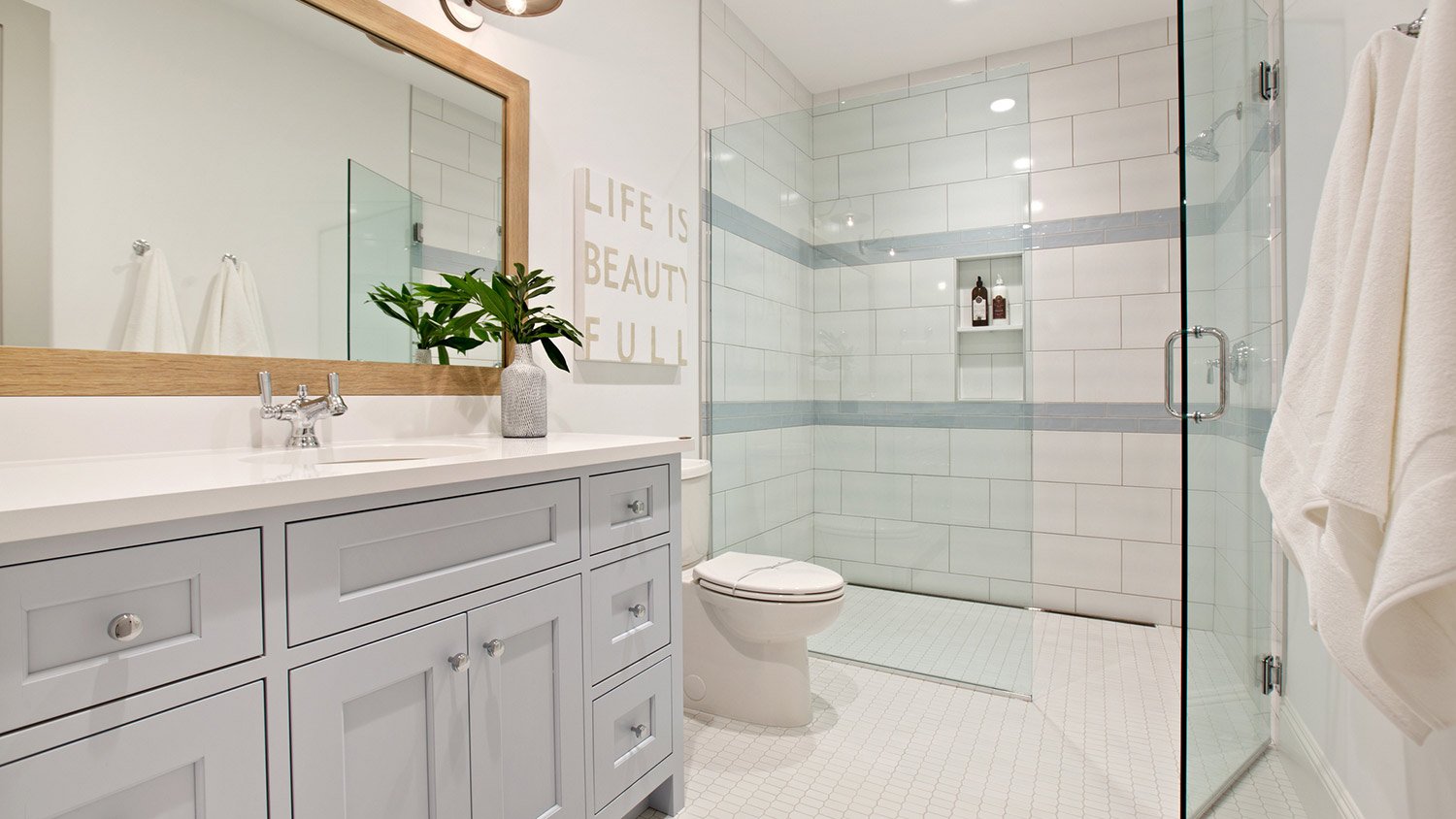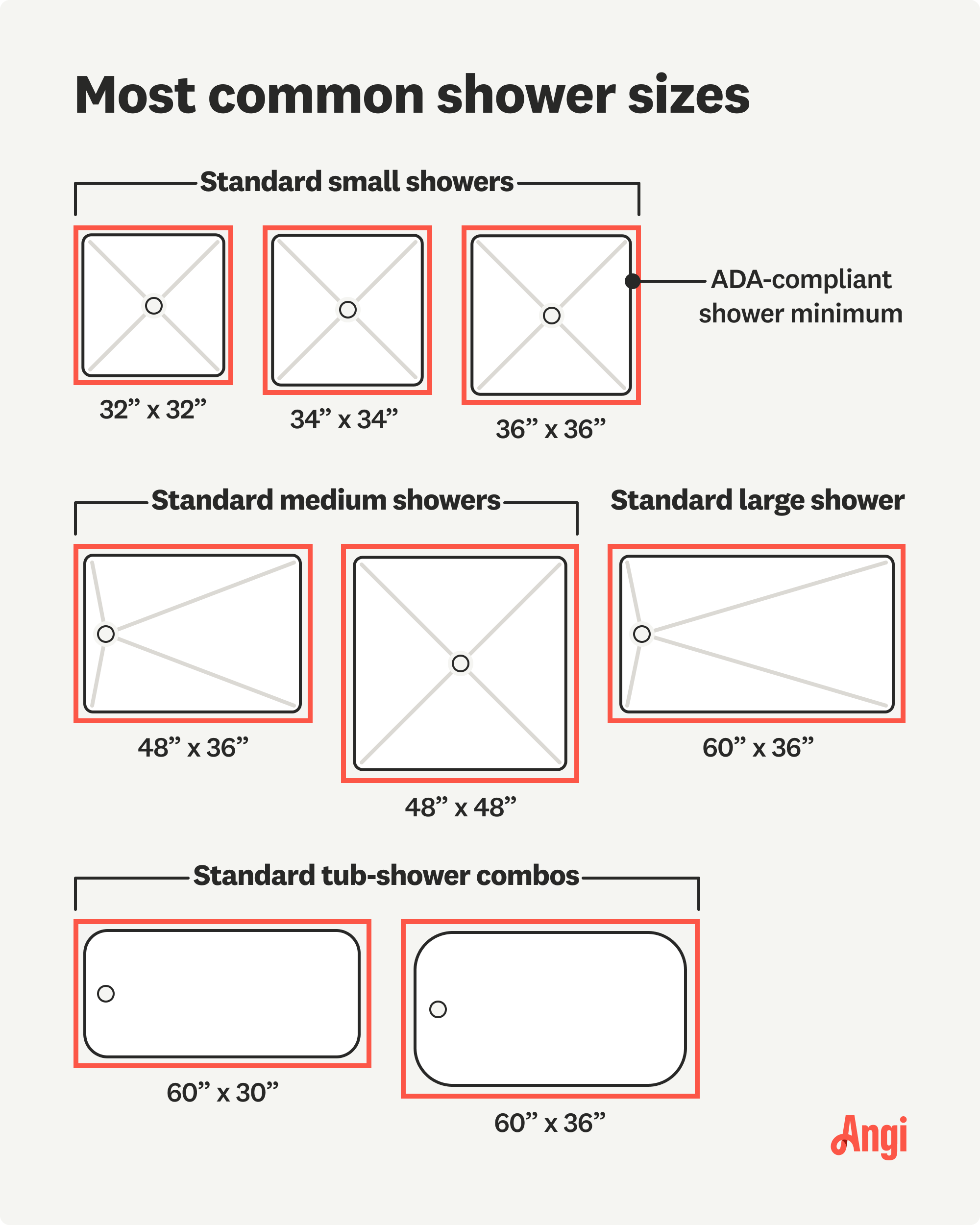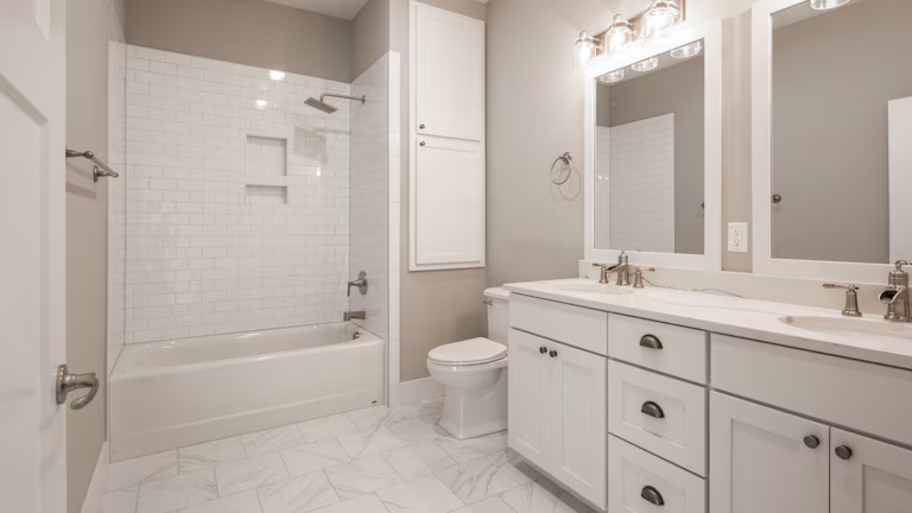
Sink installation costs depend on the type of sink, the material, and the labor. This guide can help you budget for your project—from pedestal to farmhouse.
The average cost to install a shower is $8,196, but it varies from $4,446 to $12,365 depending on the type of shower, materials, and customizations.


Shower installation costs depend on shower type, size, materials, design, and other factors.
A walk-in shower costs $1,150 to $8,000 on average, while a tub-shower combo costs between $1,500 and $8,500.
Labor will account for 40% to 60% of the total project cost.
If you have a standard-size shower opening, you’ll save $1,500 to $5,000 by purchasing a prefabricated model.
Shower installation costs an average of $8,196, with projects falling between $390 and $16,875. That said, most homeowners spend $4,446 to $12,365 on a new shower. The type of shower, size, design, and labor rates play a role in your final price.
To help homeowners with their next project, Angi provides readers with the most accurate cost data and upholds strict editorial standards. We’ve surveyed thousands of real Angi customers about their project costs to develop the pricing data you see, so you can make the best decisions for you and your home. We pair this data with research from reputable sources, including the U.S. Bureau of Labor Statistics, academic journals, market studies, and interviews with industry experts—all to ensure our prices reflect real-world projects.
The type of shower will influence its price, with a walk-in shower costing between $1,150 and $8,000 and a tub-shower combo costing between $1,500 and $8,500. Other shower types include steam showers, accessibility showers, and tub-to-shower conversions. Here’s what you can expect to pay for each type:
| Shower Type | Average Cost Range |
|---|---|
| Walk-in shower | $1,150–$8,000 |
| Tub-shower combo | $1,500–$8,500 |
| Steam shower | $2,800–$7,100 |
| Accessibility showers | $1,750–$8,600 |
| Tub-to-shower conversion | $1,200–$8,000 |
Larger showers naturally cost more. For example, a standard walk-in shower measures 32 by 32 inches, and you’ll spend around $1,150 ($210 per square foot) for a prefabricated design. On the other hand, you’ll spend around $3,000 ($240 per square foot) for a standard tub-shower combo that’s 30 by 60 inches.

When installing a new shower, labor accounts for 40% to 60% of the total project cost. You might need to hire a licensed plumber near you to add a new fixture or relocate pipes. Depending on your specific bathroom, you may also need an interior designer, electrician, interior painter, or handyman.
Here’s how much each pro will cost, on average, to install a shower:
Plumber: $45–$200 per hour
Interior designer: $50–$200 per hour
Electrician: $50–$120 per hour
Interior painter: $20–$50 per hour
Handyperson: $50–$150 per hour
Several additional factors can impact the cost of your new shower installation, including materials, design, demolition, permits, and more. Here’s what you can expect, on average, for some common project costs.
Materials: $2,000–$10,000+ premium for luxury materials, such as natural stone or imported tile
Demolition and prep: $50–$100 (or possibly higher if you need to demolish walls or remove and replace pipes)
Post-construction cleanup: $250–$700
Permits: $250 on average
Shower tiles: $1,800–$6,850, depending on type
Shower pan: $900–$2,300
Bathtub and shower liner: $2,700–$10,000
Custom jets: $900–$2,000+
Custom drainage: $750–$1,250
Shower doors: $530–$1,400
Shower head: $100–$450
Tub faucet: $450–$1,000
Bathroom fan: $240–$560
Prefab showers are more affordable than custom ones, as you’ll spend around $250 to $2,900 for a kit (excluding installation costs). Custom showers have a broader cost range, and you’ll spend more when purchasing materials individually. Indeed, materials alone will cost $1.25 to $200 per square foot for a custom shower.
Professional labor adds $400 to $2,000 to your shower installation cost. While you may be tempted to save money with DIY installation, you should only install a shower yourself when using a shower or tub liner or a prefab shower kit. DIYing a liner costs around $500, including the liner and materials.
Here’s why you should hire a pro for shower installation:
Plumbing, tiling, and waterproofing require specialized skills, and mistakes can result in long-term damage.
Repairing this damage can be more expensive than hiring a professional, especially if there’s mold, rot, or structural issues.
Pros follow local building codes and obtain necessary permits.
A pro can complete the job quickly and effectively.
Most professional work is backed by a warranty.
Pros can anticipate and resolve hidden issues.
You’ll get a cleaner, polished finish by hiring experts.
You might consider a DIY shower installation in the following situations:
You’re installing a prefabricated kit
You’re an experienced DIYer with prior knowledge of plumbing, tiling, and waterproofing.
You’re familiar with local building codes and permit requirements.
You’re only handling demolition or basic prep work ahead of professional installation.
The project doesn’t involve moving or rerouting plumbing or drain lines, custom tiling, installing jets, structural repairs, or other complex tasks.
You have enough time to complete the project without rushing.
You can obtain the right equipment and use it safely.
Even if you’re confident in your DIY abilities, it’s smart to consult a pro before you start, especially for plumbing, waterproofing, or code-related questions.
Installing a shower can increase a home’s value, with an ROI ranging from 50% to 70%, depending on the project scope and market conditions. For example, tub-to-shower conversions often yield a 60% return, while walk-in showers average about 55%. A well-designed bathroom can appeal to potential buyers, especially if you’ve improved an outdated space.
You can save on shower installation costs with the following tips, keeping in mind that exact prices will vary.
Choose a prefab shower insert. A prefab shower insert costs between $300 and $500, while a kit that includes materials ranges from $400 to $2,000. This is the most budget-friendly type of shower, and it’s simple enough to install, which keeps labor costs relatively low.
Add a shower to your bathtub. Most commonly, people do this with a shower diverter valve that directs water to your tub’s spout or showerhead. This costs around $1,000, but you’ll also need to spend on the plumbing and labor.
Convert your tub into a shower. The average tub-to-shower conversion costs around $4,000 less than the average shower installation because you don’t have to reinstall plumbing and can match materials to your existing surround.
Don’t change your bathroom layout. Moving your shower often adds plumbing and finishing costs, including tiling, drywall, and painting. By keeping the shower in the same place, you can save between $1,000 to $5,000+.
Do some demolition yourself. You may not be able to install a shower on your own, but you can save $300 to $800 in labor by doing the demolition yourself.
Mind your materials. If you don’t want a prefab shower, keep costs down by using budget-friendly materials.
Skip the extra features. Choose the shower features and accessories you absolutely need. For example, you can save $600 to $1,300 on a shower door if you opt for a tension rod and curtain (but it depends on the design of your shower).
While hiring a bathroom remodel pro adds $400 to $2,000 to your shower installation cost, it’s highly recommended over DIY.
Pros can prevent costly mistakes that result in long-term damage, and they’re specialized in plumbing, tiling, and waterproofing.
You can save money by choosing a prefab shower insert, keeping your bathroom layout the same, avoiding luxury materials, and doing some of the demolition yourself.
From average costs to expert advice, get all the answers you need to get your job done.

Sink installation costs depend on the type of sink, the material, and the labor. This guide can help you budget for your project—from pedestal to farmhouse.

Curious how much a shower remodel costs? From new fixtures to full installations, we have the prices you need to know to establish a shower remodel budget.

If your bathroom needs sprucing up, a new vanity will make a big difference. Vanity installation costs depend on the size and type of the countertops and fixtures you choose.

From farmhouse to double basin, kitchen sinks can vary by installation method and bowl configurations. Pick which type of kitchen sink is best for your home in the guide below.

There are bathroom vanities for bathrooms of all sizes, from floating units to custom cabinetry. Find out which bathroom vanities are the best for your home.

Replacing or installing an attic ladder provides a safe way to access your attic. Learn what factors affect attic ladder installation cost to help you budget.